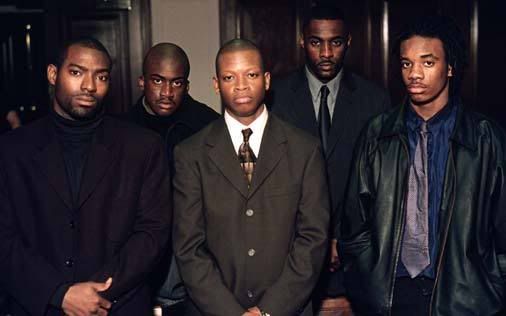
Did I cause Chris Webber to retire?
Because if I did, I didn't mean to.
One day after I wrote an article in which I basically said (among other things) that I can't wait to see if Michael Beasley ends up becoming a failure like him (bad as it sounds and as bad as I felt writing it, that's what it was and that's the way I feel), Webb has decided to call it a career. He goes out on a whimper.
The disappointing, ill-fated arc of Chris' career started 15 years ago in New Orleans, at the Superdome, in the Wolverine's second consecutive NCAA title game appearance, when Webb called the timeout his team didn't have against North Carolina. It is one of the most imfamous and costly gaffes in sports history, no question, but it's real weight rests in it's foreshadowing and symbolism: it was sad, it was unfortunate, and it was the first hint that perhaps Webber was not one that was meant for the big moments. Remember, before he called the timeout he clearly traveled; I was like 5 years old when that happened, but if it happened today, I would immediately be like, "Uh-oh. Can this guy be trusted? Should a potential NBA franchise guy look that nervous in crunch-time? Isn't this a serious cause for concern?"
Webber was the leader of the greatest class of players on one team in college basketball history, and the coolest amateur squad ever. Just as much, the young Webber gave the world a glimpse of basketball perfection: 6-10, long-limbed, grown-man body. Impossibly soft hands, some of the best ever. Explosive and agile. Ran the court like a guard, handled and dished like one, too. Shot with range and finished around the hoop with touch. He was the complete package, and then some.
And by most standards, he had an outstanding NBA career. He played 15 seasons, winning Rookie of the Year, making 5 All-Star teams and a first-team All-NBA in 2001. Led the league in rebounding in '99 (the strike year, but still). He averaged 21, 10, and 4 for his career and was the best player on some really good Sacramento teams. He was one of the best passing big men of all-time and one of the top-3 power forwards of his era. And when he peaked from 2000-2003 with Sacramento - 24.8 points, 10.6 rebounds, 4.7 dimes, 1.5 steals and 1.5 blocks on 48 percent shooting - the four position, at least offensively, peaked with him. 19 footers, hook shots, murderous dunks, in-game contests with Vlade to see who could throw the more deft wrap-arounds, ludicrous handle for a man his size, and ball-control wizardry. I'll never forget it. Then, when a knee injury robbed him of his athleticism at 30, he learned to play on the ground, relying on supreme basketball skill and knowledge to remain a highly effective, 19 and 9-type player, the version of him that I admired the most.
Yet with Webber, we'll always remember him for who he wasn't and what he didn't do than what he was and what he did do. We'll remember that despite the gifts that should've made him the best power forward ever, he never won an MVP and never played in the Finals. We'll remember the bad moments, like his shrinking performance in the waning moments of Game 7 of the 2002 Western Conference Finals. We'll remember the moments that made him seem like the unluckiest basketball player in the world, like that fateful night in Louisiana or when he blew out his knee in Game 2 of the 2003 Western Semi's against Dallas, just when it seemed that the Kings had the best team and were going to win the whole damn thing. We'll remember that he was injury prone. We'll remember the fact that he played in back-to-back NCAA title games and lost both of them, a precursor to his pro career and his ultimate legacy:
He couldn't win the big one.
Is that fair? I guess. But whatever the case, Webber seemed satisfied today at the press conference announcing his retirement. He says he doesn't feel like going through the drudges of rehabbing his troublesome knee and that he's happy with what he's accomplished, which is good, and which is definitely the most important thing.
But for the rest of us? It's just the final chapter in the saga of an incomplete and mischanced career.







